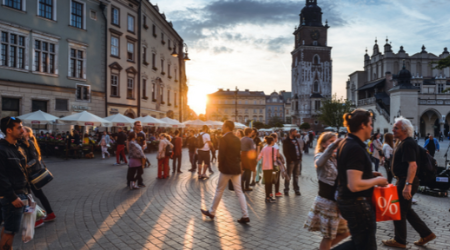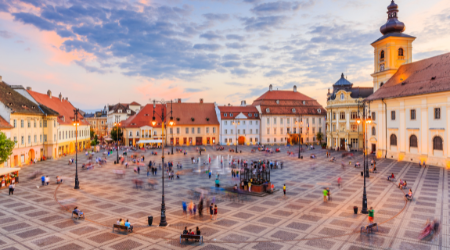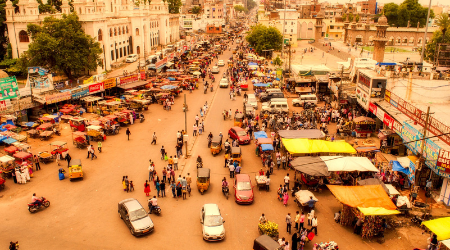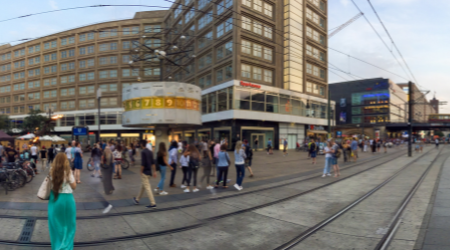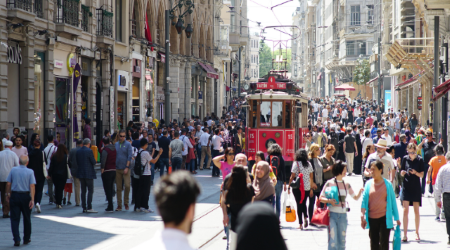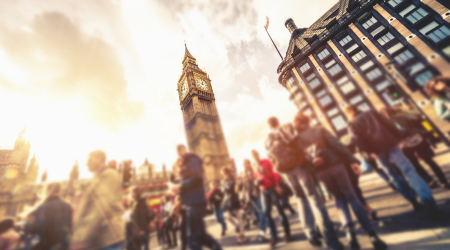War in Ukraine: A View from the Netherlands
I (Merel) was born and raised in ‘s-Hertogenbosch, a city in the “Burgundian” part of the Netherlands, packed with hospitality and southern Dutch charm. After finishing high school there, I earned master's degrees in Law and Business. I started my career at a Dutch bank but moved to the United States in 2015 to be with my (now) husband, who is American. All of my family and Dutch friends still live in the Netherlands, which is why I try to visit the country regularly and stay closely informed about what goes on there. And from what I hear, support for Ukraine and the Ukrainian people has been extraordinary.
I (Klaas) was born and raised in a medium-sized town in the northern parts of the Netherlands in the province of Friesland, which also resounds in my last name. After studying history and economics, I moved to Belgium to work for The Conference Board and also started a family there. Now, years later, we have returned back to the Netherlands and reside in the city of Zwolle. I’m not directly involved in offering assistance to Ukraine, but rather indirectly, for example through fundraising campaigns at our kids’ school and the collection of goods at our local church which serves as a hub for the city.
How is the Netherlands reacting to the war in Ukraine?
The Netherlands has a strong culture that respects human and civil rights. The cultural sensitivity, empathy, and practical nature of the Dutch people are partly due to economic necessity, which stems from a long history of trade (the Dutch formed the first publicly owned corporation and still is a hub through which companies around the globe do business) and from its geographical position between three great western European powers (Germany, France, and the UK). The Dutch response to the Russian invasion of Ukraine should be seen against this backdrop.
Indeed, in addition to condemning the Russian attack on Ukraine in the strongest possible terms, the Dutch government has reacted in myriad ways. It is providing humanitarian, economic, and military support. In fact, since the war started, the Dutch government has:
- Made at least €40 million available for emergency aid for victims of the war and financially supported international humanitarian organizations;
- Sent (and continues to send) medicine and aid supplies;
- Provided the UN Office of the High Commissioner for Human Rights with monetary aid to support the expansion of its human rights work in Ukraine;
- Supplied more than €65 million in military goods to Ukraine—and pledged to dispatch even more military aid that comprises heavy weaponry and armored vehicles;
- Supported and implemented the EU-imposed sanctions against Russia. To this end, it has appointed a National Coordinator for Sanctions Compliance and Enforcement at the Ministry of Foreign Affairs.
And then there’s the civilian response, which has been noteworthy as well—especially given that Ukraine and the Netherlands aren’t neighboring countries with a lot of shared history but are more than 1,150 miles apart. Yet, the distance hasn’t stopped the Dutch from (1) protesting en masse against the Russian invasion; (2) organizing numerous fundraising and benefit events; (3) donating large sums of money to charities and aid organizations, such as the Red Cross and UNICEF; (4) forming drop-off donation points for much needed supplies across the country; and (5) driving convoys with humanitarian provisions into Ukraine. Another small, but thoughtful initiative has been to turn Dutch street signs into the Ukrainian flag out of solidarity with the Ukrainian people.
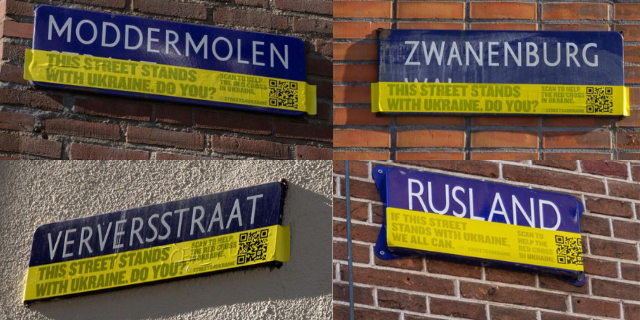
Source: Instagram, streets4ukraine
In addition to these initiatives, Dutch civilians have also welcomed thousands of Ukrainian refugees into their homes: as of April 19th, the Netherlands is counting close to 40,000 registered Ukrainian refugees, 10,000 of which are with host families or other private initiatives, and 30,000 living in temporary refugee centers and accommodations organized by local councils across the country. The country expects to receive at least another 10,000 refugees in the foreseeable future.
Ukrainians with a biometric passport are currently allowed to stay in the Netherlands for a maximum of 180 days without a residence permit because they receive temporary protection under the European Union Temporary Protection Directive. However, they will need to register in the municipality where they are staying. The temporary scheme for Ukraine entitles them to shelter, health care, and education for underage children, as well as the possibility to work without needing a work permit. They also are given a subsistence allowance ($260 per month per person) to buy food and clothing.
How does the recent past inform the present?
At the same time the Dutch fiercely support Ukraine, the Dutch view is also shaped by other recent events.
In 2014 a plane with overwhelmingly Dutch tourists on board crashed in the Donbas region in Eastern Ukraine, where separatist forces backed by Russia were fighting the National Ukrainian army. This tragic event led to a national trauma. While an independent international investigative team concluded it was hit by a rocket launched by a Russian army brigade, the Russians have always denied involvement and instead pointed the blame to Ukrainian forces and have not cooperated in the investigation nor the prosecution of the perpetrators. As we’ve seen in other contexts, Russia specializes in raising doubts.
The second event relates to the signing of an association agreement to further political and economic cooperation between the EU and Ukraine. While the Dutch overall support free trade and open borders, they are lukewarm to further EU expansion toward new countries or through expanding the remit of EU powers. This comes from a sense that they are paying a disproportionate amount into the EU budget. There is also a general feeling of distrust toward Eastern countries as the Dutch perceive their political systems as corrupted. As most things in the EU require unanimity, sensing the pivotal role of a smaller member state, Russian disinformation campaigns have heavily targeted the Netherlands over the years. This led to a (nonbinding) referendum on the association agreement in 2016 which resulted in a two-thirds majority of voters against the agreement. The agreement was nonetheless ratified by the government, but it partly helps explain recent hesitancy among the Dutch government to further increase ties between the EU and Ukraine.
How Dutch people feel about their own safety and security
Since the Netherlands is relatively far from Ukraine, people aren’t too concerned about their own physical safety. There is, however, concern about possible cyberattacks, as well as an energy deficit, should Russia halt its gas supply to the EU in retaliation for the imposed sanctions. Even though its dependency is much less than other countries (e.g., Germany), the Netherlands imports nearly 20 percent of its natural gas from Russia and has been seeking alternative sources in the wake of the invasion. Yet, the government is not yet activating its gas crisis plan. In order to reduce dependence on Russia, the Dutch government has called on Dutch citizens and businesses to turn down their heating. In government buildings, the heating has already been decreased by 2 degrees, from 21 to 19 degrees Celsius. Moreover, the Netherlands, which has the biggest onshore gas field in western Europe, may prolong gas drilling in its northern province Groningen, even though it was previously slated to be closed due to earthquake risks.
Political and international relations
Partly for the above mentioned reasons, relations with Russia have steadily deteriorated over the years and were already at a relatively low level even before the conflict started. Due to sanctions and countersanctions in the wake of Russia’s annexation of Crimea, trade in goods between Russia and the Netherlands has also steadily deteriorated and is still below the peak reached around 2012–2013. Political relations with Ukraine are also subdued currently, as the Dutch are leading a coalition to stop a fast-track EU membership for Ukraine. Finally, should it come to a prosecution of war crimes committed in Ukraine, this will take place at the International Criminal Court (ICC) in the Hague. However, neither Ukraine nor Russia are signatories to the ICC, which would make prosecution difficult to enforce in practice.
At the same time, there is increasing domestic criticism that the government is not doing enough with regard to sanctions on Russia. Two things stand out. First is the role of the Netherlands as a facilitator of financial flows of disputed origin and an overall tax haven, which has benefited Russian oligarchs and cost Russian taxpayers. The second has to do with Russian (financial) links to Dutch political representatives. Both these factors have been investigated and known for a while, but have not been acted upon. This may change however as the situation in Ukraine further escalates and demands for action on these fronts increase.
Business issues
As is the case globally, the main direct impact of the war relates to (energy) inflation, which jumped in March to the highest month-on-month rate seen since 1964. This in turn is dampening consumer confidence, which was steadily trending downward since October 2021 as energy, and particularly gas prices, started increasing rapidly. Consumer confidence in March dropped below the level it experienced during the pandemic and declined further in April, bringing consumer confidence to the lowest level since the inception of the index in 1986.

The impact of this drop in consumer confidence on the economy is difficult to assess given the overall rebound from the pandemic recession in general that is still ongoing as well as the rebound from the lockdown in relation to the Omicron wave toward the end of 2021 in particular. Business investment and consumer spending have been robust recently, and the job market is very tight with more vacancies than job seekers. Nonetheless, The Conference Board downgraded the growth forecast for this year, as we expect 3.1 percent GDP growth, versus our forecast 4.1 percent before the conflict. This is a substantial downgrade, but does not represent a recession. If anything, growth of 3 percent would still be well above the medium-term potential of the Dutch economy, which we estimate at about 1.2 percent per year.
Conclusion
We hope this essay highlights some of the country- and cultural-specific reactions to the Russian invasion of Ukraine. The support for Ukraine and Ukrainians is strong. At the same time, concerns about the economic impact of the war and about the extension of the EU further to the East highlight the importance of not taking support for granted and for policymakers and business leaders to present the full picture of the conflict in a broader context.







